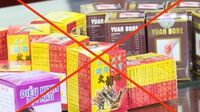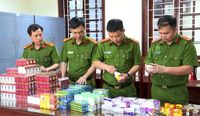The Drug Administration of Vietnam has issued a crucial warning regarding counterfeit medications following a significant crackdown by Thanh Hoa Provincial Police. This operation dismantled a nationwide network involved in the production and distribution of fake drugs, prompting health authorities to take immediate action.
In a recent communication, the Drug Administration alerted various provincial health departments about 21 counterfeit drugs that have been identified in this operation. Among these, four specific products were found to have labels and registration numbers that closely resemble legitimate medications approved by the Ministry of Health. These include Clorocid TW3 tablets, Tetracycline TW3 tablets, Pharcoter tablets, and the Neo-Codion drug.
According to the Drug Administration, the four identified counterfeit drugs are:
- Clorocid TW3 tablets (Cloramphenicol 250mg), Registration number: VD-25305-16, manufactured by TW3 Pharmaceutical Joint Stock Company, packaged in plastic bottles containing 400 tablets.
- Tetracycline TW3 tablets (Tetracycline hydrochloride 250mg), Registration number: VD-28109-17, also from TW3 Pharmaceutical Joint Stock Company, similarly packaged.
- Pharcoter tablets (Codeine base 10mg; Terpin hydrate 100mg), Registration number: VD-14429-11, produced by Central Pharmaceutical Joint Stock Company 1 (Pharbaco), packaged in plastic bottles of 400 tablets.
- Neo-Codion drug, which is officially licensed for circulation by the Ministry of Health under circulation permit number 300111082223 (old registration number: VN-18966-15). It contains active ingredients such as Codeine base (in the form of Codeine camphosulfonate 25mg) 14.93mg, Sulfogaiacol 100mg, and Grindelia soft extract 20mg, and is packaged as sugar-coated tablets in a box of 2 blisters x 10 tablets, manufactured by Sophartex, France.
Notably, the remaining 16 products on the list do not match any medications that have been registered for circulation by the Ministry of Health, raising serious concerns about public safety.
The Deputy Director of the Drug Administration, Mr. Ta Manh Hung, emphasized the urgency of the situation, stating, "These counterfeits pose a significant risk to public health, and immediate action is required to prevent their distribution." He urged health departments across the country to notify all drug-using establishments to refrain from selling or using these counterfeit products.
In response to this alarming discovery, the Drug Administration has mandated that health departments strictly enforce existing regulations. This includes the implementation of Official Dispatch No. 41/CD-TTg, dated April 17, 2025, which outlines procedures for handling the production and trade of counterfeit medicines. Additionally, they are following Directive 17/CT-TTg, dated June 19, 2018, aimed at strengthening efforts against smuggling and trade fraud in pharmaceuticals.
Health facilities are being instructed to review their drug procurement processes to ensure that all supplied medications are from legitimate sources and have proper documentation. In cases where counterfeit drugs are suspected, facilities are directed to seal these products immediately, cease their use, and report the matter to health authorities for further investigation.
Furthermore, health departments are encouraged to collaborate with media outlets to disseminate information about the dangers of counterfeit drugs to the public. Citizens are urged to purchase medications only from licensed pharmacies and to report any suspicious activities related to drug sales.
As part of the ongoing efforts to combat counterfeit medications, the Drug Administration has also called for increased inspections of pharmaceutical businesses, both wholesale and retail, to ensure compliance with regulations. This includes a focus on verifying the origins of drugs being sold and increasing sampling for quality control checks on medications that are at risk of being counterfeited or are of poor quality.
The recent crackdown and subsequent warnings highlight the ongoing battle against counterfeit drugs in Vietnam. The authorities are determined to protect public health and ensure that only safe and effective medications are available to the public. As counterfeit drugs can have severe health implications, the public's cooperation and vigilance are essential in this fight.
In conclusion, the Drug Administration's proactive measures and the swift actions taken by Thanh Hoa Provincial Police exemplify the commitment to safeguarding the health of citizens. The public is encouraged to stay informed and report any suspicious drug activities to help combat this growing issue.





